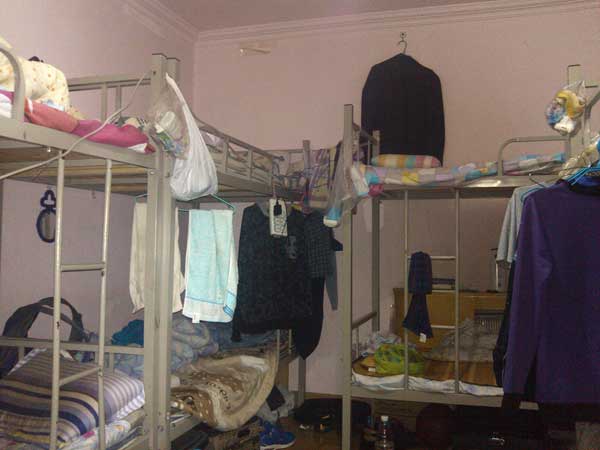Home truths for low-cost housing
Reporter's log
Cramped and dirty conditions are rule of the day
After paying visits to two illegally sublet apartments and talking with people who had lived in such places, I thought I was well prepared to spend a night living in one myself.
I was wrong.
With its blaring pop music, endless stream of pedestrians, trendy bars and neon lights, the area around the Wudaokou Subway Station is one of Beijing's liveliest. Yet when the door of the dark apartment I had arranged to stay at opened, I found myself in a very different world.
 |
|
This room in the Dongshengyuan Apartment Building near Beijing's Wudaokou area is a typical shared unit that often houses seven or eight tenants. hou liqiang / China Daily |
The apartment originally had just two bedrooms, according to Sun, the tenant subletting the space. It is now filled with bunk beds. I counted 22 in all, including one in the kitchen.
Clothes hung off the edge of every bunk, intermingled with wires connected to electrical outlets through a series of multisockets. Floors were covered in mountains of belongings, garbage and thick dust, all contributing to an unpleasant odor.
The single bathroom, which you knew you were getting close to by the dampness of the floor, was occupied almost every minute during the evening. So too was the washing machine.
Sun, the subletter, had put notices on the wall stating that the water heater and washing machine were free to use only between 5 am and 11 pm, otherwise there would be a 5 yuan ($0.80) charge. Despite waiting all night, only 10 minutes before the deadline did I finally get a chance to take a shower.
I instantly regretted it. The nozzle, wrapped in thick Scotch tape and held up with string, barely dribbled cold water, while on the soap rack were two abandoned pairs of men's underpants.
The air-conditioning units could be switched on only after 11 pm, according to Sun's rules, so my room, which had five bunk beds and one electric fan, was sweltering.
Yet it did not prevent my fellow tenants and I from enjoying a conversation before bed. Most were fresh graduates or newcomers to Beijing. They were happier than I expected, or at least I did not hear any complaints about the conditions. When I asked why they chose this kind of place, one man smiled and said, "If not here, where?"
He worked nearby, he said. "I can't afford a place on my own, and I don't want to live in the suburbs, spending hours traveling every day."
Another tenant, from Xuzhou in Jiangsu province, gave a similar answer, and added, "I don't have many friends in Beijing, and I don't want to live alone."
At 11 pm, it was lights out. Those who did not want to sleep played on their laptops or cellphones, using earphones to avoid making noise. The only sound was from the creaking bunk beds, which erupted with even the slightest movement.
The quilts and sheets, provided by Sun, were dirty and made me itch. I eventually managed to fall asleep at 2 am, only to be woken again at 6:30 am by a bout of cacophonic creaking set off when someone got up to go to work.
I got up, packed up and headed out toward the subway station, glad to be heading home to my apartment for a proper shower and some rest.





















